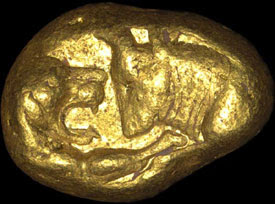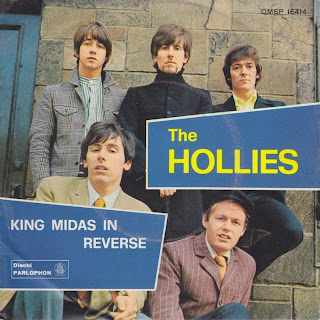He's King Midas with a curse
He's King Midas in reverse
[The Hollies released a lot of great singles, but I think "King Midas in Reverse" is hands down the best of them. Since it went nowhere on the Billboard "Hot 100," so I'm putting it in the 2 OR 3 LINES "GOLDEN DECADE" ALBUM TRACKS HALL OF FAME – not the 2 OR 3 LINES "GOLDEN DECADE" HIT SINGLES HALL OF FAME. Here's a very lightly edited version of my original post about "King Midas in Reverse," which appeared on September 24, 2013.]
* * * * *
I'm not sure Graham Nash fully appreciates the implications of King Midas having a "golden touch."
"King Midas in Reverse" was released by the Hollies as a single in September 1967. Like virtually all original Hollies songs, Allan Clarke, Tony Hicks, and Graham Nash all got writing credits. But it was really written by Nash.
 |
| Graham Nash |
The song barely cracked the top 20 in the UK, and peaked at #51 on the U.S. charts. (That doesn't sound so bad until you realize that 12 of the 13 previous Hollies singles had made it into the top ten in the UK, and nine of those singles cracked the top five.) The song's failure to sell better led indirectly to Graham Nash's leaving the Hollies.
Nash had pushed the other Hollies to record more ambitious music, but the ho-hum reaction of the public to "King Midas in Reverse" and the album it appeared on led Clarke and Hicks to insist on going back to more pop-type material. When the rest of the band refused to record Nash's "Marrakesh Express," he packed up and moved to Los Angeles, where he hooked up with Stephen Stills and David Crosby.
Nash had pushed the other Hollies to record more ambitious music, but the ho-hum reaction of the public to "King Midas in Reverse" and the album it appeared on led Clarke and Hicks to insist on going back to more pop-type material. When the rest of the band refused to record Nash's "Marrakesh Express," he packed up and moved to Los Angeles, where he hooked up with Stephen Stills and David Crosby.
* * * * *
The moral of the myth of King Midas is "Be careful what you ask for." But a lot of people – including Graham Nash – seem to view King Midas's golden touch as a good thing when it was actually a terrible curse.
Midas, who ruled a kingdom in Asia Minor before the time of the Trojan War, was given his golden touch by Dionysius, the Greek god of the life force (i.e., the god of wine, sex, etc.). When one of the satyrs who followed Dionysius got hammered and passed out in Midas's famous rose garden, the king treated him kindly, earning the gratitude of the god.
When Dionysius rewarded Midas by granting him a wish, Midas foolishly asked that everything he touch be turned into gold.
The first clue that this was not a wise decision came when Midas touched one of his beloved roses. It was instantly transformed from a living thing of beauty into a lifeless, solid-gold rose – lifeless, although worth a pretty penny.
But when Midas's lunch turned into indigestible precious metal when he started to partake of it, he began to realize that he might have made a serious mistake.
The light bulb really went on over his head when he touched his beloved daughter, instantly turning her into a statue.
The light bulb really went on over his head when he touched his beloved daughter, instantly turning her into a statue.
 |
| King Midas with his daughter |
* * * * *
I was thinking about the practical implications of having a golden touch today. Let's say you eat some bad Chinese food and have to run to the bathroom to do #2 – does the water in the toilet turn to solid gold when the you-know-what hits it? That would be most inconvenient.
And what about having sex with Mrs. Midas? You don't want to turn her to gold, obviously. At first I was thinking King Midas could wear a condom to defeat the golden touch. But the condom would turn to gold, and that would sort defeat the purpose, wouldn't it?
In any event, after turning his daughter into gold, a horrified Midas begged Dionysius to take his golden touch away. The god took pity on the king, telling him to bathe himself in the Pactolus River. The river washed away the golden touch, but the sands on the river bottom turned to gold and eventually washed down to Lydia. According to the Greek historian, Herodotus, the Lydians invented gold coinage in the 7th century B.C.
 |
| Ancient Lydian gold coin |
* * * * *
The man who is the subject of "King Midas in Reverse" is cursed because everything he touches turns to dust. That's bad, of course, but Graham Nash is missing the point. It's really no better when everything you touch turns to gold – you're cursed either way.
By the way, there's another myth about King Midas. Once upon a time, the half-man, half-goat god Pan – the god of forests and hunting and shepherd and their flocks – challenged Apollo to a music contest. Pan played his pipes, and Apollo his lyre, and the mountain-god Tmolus judged Apollo the winner.
Midas, who was a devotee of Pan, questioned the fairness of Apollo's victory. Apollo punished him for his lack of musical taste by giving him big donkey ears. Midas concealed his ears under a big hat, but eventually had to go to the barber, who saw the donkey ears.
 |
| Statue of King Midas with donkey ears |
The barber just had to share the secret with someone. There was no TMZ back in those days, so he dug a hole, whispered the secret into the hole, and then filled it up with dirt. The reeds that later grew on that spot whispered "Midas has donkey ears!" every time the wind blew, and Midas was so embarrassed when word got out that he moved away from his kingdom, never to be seen again.
* * * * *
Click here to listen to "King Midas in Reverse."
Click below to buy the record from Amazon:




No comments:
Post a Comment